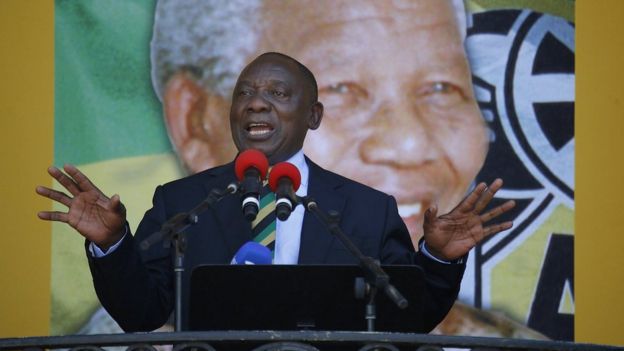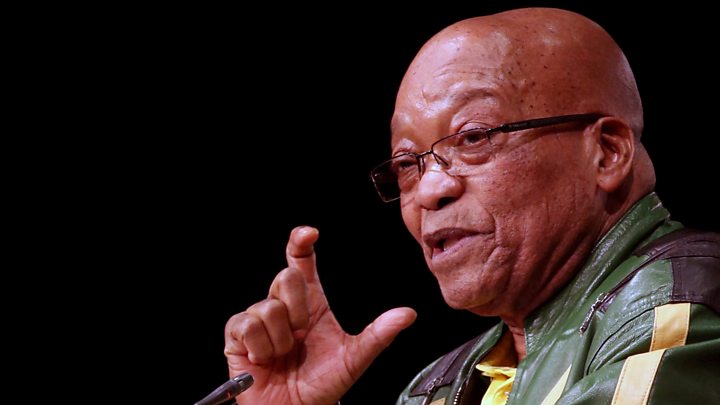South Africa: ANC Leaders Expected to Ask President Zuma To Resign
Leaders of South Africa’s governing ANC party are meeting to decide the future of President Jacob Zuma.
The National Executive Committee (NEC) is likely to ask him to step down, says BBC Africa correspondent Andrew Harding.
ANC president Cyril Ramaphosa acknowledged on Sunday that the issue was causing “disunity and discord”.
Mr Zuma, 75, faces a number of corruption charges after nine years in power.
There are 112 members of the NEC, and many may want to share their views during the meeting in Pretoria – meaning it they may not finish until late on Monday.
What did Mr Ramaphosa say?
“We know you want closure,” Mr Ramaphosa said on Sunday, addressing supporters who had gathered to mark 100 years since the birth of the country’s first black president, Nelson Mandela.
He told the crowd in Cape Town that “our people want this matter to be finalised” and that the African National Congress (ANC) would comply.

He acknowledged the ANC was going through “a period of difficulty, disunity and discord”, and said he was seeking “a new beginning”.
He pledged to tackle the corruption that has marred Mr Zuma’s time in office.
Mr Ramaphosa urged South Africans to restore the values that Mr Mandela – also known as Madiba – stood for, and said those who had stolen state assets would be brought to justice.
“We must work together as Madiba taught us to push back the frontiers of poverty, unemployment and inequality,” he said.
An NEC meeting was called off last week following direct talks between Mr Zuma and Mr Ramaphosa, who is the deputy president as well as the new leader of the party.
Mr Zuma has resisted increasing pressure to quit since December, when Mr Ramaphosa replaced him as leader of the ANC.
What has Mr Zuma done wrong?
Mr Zuma’s presidency has been overshadowed by allegations of corruption.

In recent years his links to the wealthy India-born Gupta family, who are alleged to have influenced the government, have caused his popularity to plummet.
Both Mr Zuma and the Guptas deny the allegations.
Why hasn’t the ANC sacked him before?
By Lebo Diseko, BBC News, Johannesburg
It is worth noting that Mr Zuma has not actually been found guilty of any of the accusations against him.
The allegations that there is a corrupt relationship between Mr Zuma and the Gupta family are just that, allegations. And 18 corruption charges, stemming from a 1990s arms deal, were dropped before he became president and have not been reinstated.
On top of this, Mr Zuma is still very popular, particularly in rural areas and his home region of KwaZulu-Natal.
Mr Ramaphosa may want to make sure Mr Zuma’s supporters do not feel he has been treated badly – especially as an election is coming up next year.
What happens next?
Correspondents say that if the NEC agreed to recall Mr Zuma, it would be very difficult for him to resist.
But he is not legally obliged to step down if they ask him to.
If he so wishes, Mr Zuma could carry on as president of South Africa even if the NEC asked him to step down.
However, he would then be expected to face a confidence vote in parliament. The date for this has already been set – 22 February.
Mr Zuma has survived other such votes, but he would not be expected to pull it off again. A confidence vote would be considered a humiliating process for him and the party.
South African media is calling President Zuma’s seemingly inevitable exit “Zexit”.
South Africa’s previous president, Thabo Mbeki, resigned in 2008. He also had a power struggle with his deputy.
The deputy in question was Jacob Zuma, who took over the presidency the following year.
Source: BBC


Comments are closed.